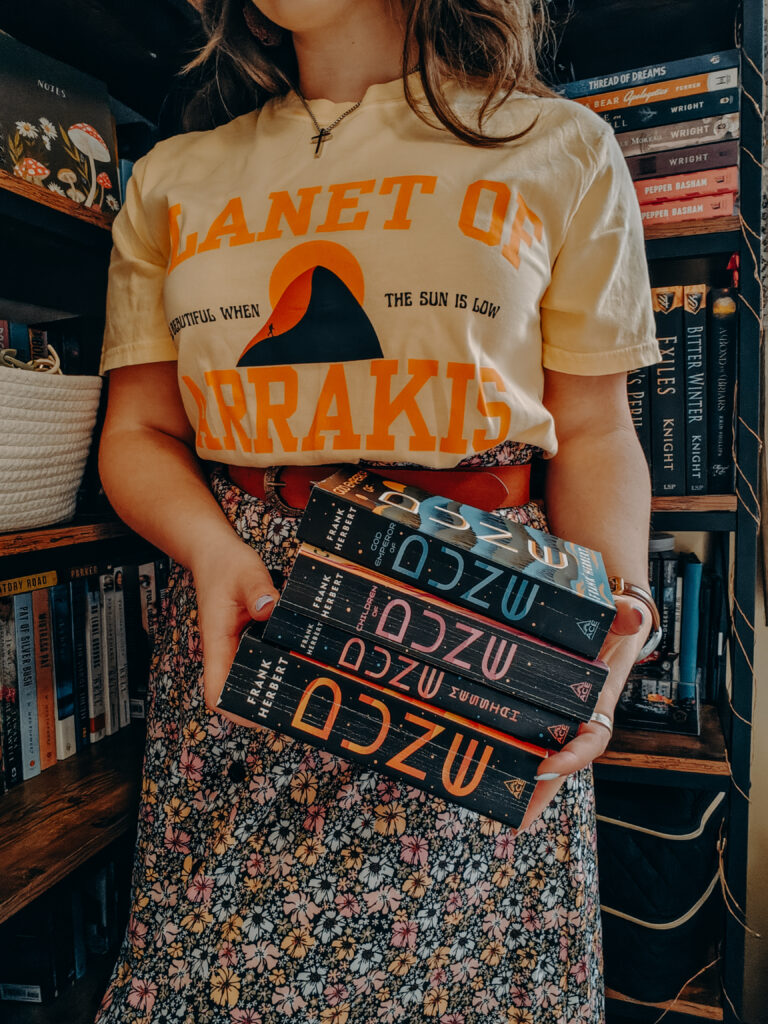I surprised even myself. Because here’s the thing. I’ve NEVER been a scifi reader. To the extreme. I had less than no interest.

But it’s no secret that I have come to love the Dune saga. Here’s why, but also with a few caveats because it’s not perfect either.
*note, I have, as of the writing of this post, only read through the first three books of the Dune series. I’ll add information as I read more, if I read more.
🌕I have loved the absolute BRAININESS of Dune. Frank Herbert has written an adventure story that is cloaked in complex layers of politics, ecology, religion and so much more. It’s like simultaneously reading a spell-binding tale of intrigue and adventure while also reading an entire series of TedTalks about a multitude of philosophy and religion.
🌕They make me think. This plays into the last one a bit, but it’s rare to find a book or series that doesn’t just make you have to think, but encourages you to use your own critical thinking instead of telling you WHAT to think. So much of media, movies, and books these days are all about ramming home political talking points, critiques, or agendas with the heaviness of a baseball bat to the head and while I don’t agree with everything in Dune, Frank Herbert writes it in such a way that I walk away coming to my own conclusions instead of being told what to think myself.
🌕It’s a TRUE dissertation on the concept of an anti-hero. The world has become with calling villains anti-heroes and hiding their obsession with evil behind the term. But the reality is that a true anti-hero is someone who had a heart that was motivated like a hero, but who made mistakes that have consequences for themselves and everyone around them. Dune portrays a TRUE anti-hero without all the “you should relate to and excuse the villain because their evilness is a byproduct of their surroundings” We see Paul suffer and struggle with the results and consequences of all the decisions that he made, many of them poor decisions. And he wrestles with them, he sees his flaws, and he lives in remorse over what he has done and that his best intentions fell short.
🌕Dune is INTENSE. It’s suspenseful. I have never been so spell bound by lengthy pontification and dialogue. One of my favorite scenes to read was in Dune Messiah and it was literally a 20 page conversation between two people and I was on the edge of my seat the whole time.
🌕Dune is a MASTERCLASS in world building. Reading it has given me an appreciation for how much the human brain is capable of. God made us with his unique creator qualities and skills and seeing someone pour themselves so much into forming a world and a series with EVERY. SINGLE. TINY. DETAIL that makes sense and fits together is mind blowing.

The Caveats:
🌕I would not recommend Dune for a young audience. I would only personally be comfortable recommending it to adults who are aware, strongly convicted and can read with discernment in a way that throws out the bad and keeps the good. Themes are heavy, the reading is brainy, and each book has had a total of about one scene or so that’s borderline in the content department.
🌕The books are not written from a Christian perspective and the religion within it, while I can see parallels, is written as a warning against giving one person too much power and the dangers of worshiping or idolizing a human. The Fremen originally seemed to worship the God of the bible, but they fall sway to idolatry and the uplifting of one man above the rest. There are definitely some faith and religious aspects that are counter-biblical at times. Again, this is where discernment comes into play.
🌕 Content: Like I said when it came to mature themes, there are occasional scenes that are a bit extra and not for young eyes. Dune Messiah has a nude scene that’s pretty tame but is there nonetheless, any sex (while it is sometimes discussed in the discussions of bearing heirs) is closed door. There is an entire thread throughout the books of a breeding and eugenics type program and how the Bene Gesserit have been matching houses and specific royal lines manipulatively to ensure that the genetics are pure and good. This leads to some risky and unethical situations and decisions being made or discussed throughout the books.

Specific Content Warnings:
Some specifics to help with those who are wanting to read it.
Dune: Paul and Chani discuss having children, there is a fade to black and closed door scene that is insinuated between them. There is a culture of taking on the wives of a man you have killed in battle and concubines exist within this culture. Paul makes it clear that while he “marries” for political advantage, he will only be intimate with Chani and bear an heir with her despite having more than one concubine for the above mentioned reasons. Discussions of the politics of marrying vs. simply being a concubine are discussed. Things like the breeding program and the eugenics are also occasionally discussed without anything intensely crude etc. Lots of scifi violence and killing but that’s too numerous to try to outline in detail. The villains are horrible people and kill for no reason at all. Some of these scenes can be uncomfortable to read depending on your sensitivity.
Dune Messiah: There is one scene where Alia is in the nude. It’s handled in a way that doesn’t necessarily sexualize her, but she is walked in on by her brother and a royal advisor. It’s just odd and incongruent. Paul has more discussions of concubines, who will bear an heir, and reminders of promises to not be intimate with anyone besides Chani. They bear children. Alia and a character named Hayt are attracted to each other and I don’t remember there being any specifically sexual scenes or comments of that nature.
Children of Dune: Leto ll and his sister Ghanima are being hunted and there is talk of the Bene Gesserit wanting them to have a child together in order to solidify the Atreides line. This is only referenced to with disgust by most of the characters, but the conversations exist. There is one scene midway through the ending on page 436 of the mass market paperback that is a slightly more detailed scene of Leto imagining sex with another character. This never actually takes place but it is detailed just enough that it made me uncomfy and I marked it to cross out in my copy. There is rumor and discussion of Lady Jessica having taken Gurney Halleck as a lover, Allia is married to Hayt and she cheats on him out of political ambition, though this is kept off screen or only implied. There is also an entire thread about demon possession that is chilling, but also a well done portrayal of it. Allia allows herself to be taken over by a demonic representation of one of her ancestors and is influenced by this demon to do evil things and manipulate her planet and family.
God Emperor of Dune: This book had way more in the way of content and I personally wouldn’t recommend it. It was far less enjoyable to me anyway and lacked a lot of the adventure and nuance of the previous books. Leto II is obviously somewhat blasphemous by nature. If you aren’t willing to read through it with discernment and understand that he is coming at it from that nature, a lot of what he says is going to bother you more. That context is important, but is pretty easily established from the cover. One of the recurring topics that Leto and Idaho chat about is the discussion of his entirely female army and the reasoning behind why he built it that way. In conversation, they do mention how from Leto’s perspective, male armies have a tendency towards a rape culture, and their is also mention of possible homosexual outcomes. There is a fair bit of discussion where mating and breeding are discussed and almost degraded to something done for no other reason other than whim or the furthering of particular genetic lines. It’s a very backwards approach, but that’s kind of the point because Leto is rather messed up mentally anyway. Some specific content pages in the mass market paperback include:
- Pg 184 – nudity as a self-defense mechanism. mentioned/observed, but not described.
- Pg 224 – nudity mentioned but not described as a traitor is stripped to be whipped
- Pg 252 – mention of voyeurism
- Pg 289 – discussion or rape culture in male dominated military
- Pg 377 – a comment made about genitalia and an observation that Leto has none
- Pg 401 – a comment about how Leto gave up his ability to procreate when he became a worm.
- Pg 415 – a minorly detailed kiss between unmarried, ill fated characters that results in a closed door sex scene. We see the characters afterwards still cuddling though it’s clear what occurred and they discuss their lust/longing for one another.
- Pg 443 – mentioned that someone saw two women kissing and was offended by it
- Pg 445 – one character berates the other for having sex with a forbidden love interest
- Pg 524 – another comment about the lack of male genitalia
- Pg 553 – a character thinks about another character in the form of attraction and desire for sex
- Pg 557 – easily crossed out, but the last line of this chapter mentions the same character having an orgasm.
I found these books to be a fascinating and thought inducing series that I never thought I would like and still am not fully sure why. I personally wouldn’t recommend book 4 and I most likely won’t be reading the rest of the original series as I have heard that they become much more sex focused and include more content than any of the others before it.
I hope you found this post helpful and I’m excited to hear your thoughts on the books if you’ve read them!



Started this series because of you, friend 🥰 so glad I did!
I saw the new Dune movie and decided I would read Dune someday, but I didn’t really act on it until I saw this post, and now I love it!